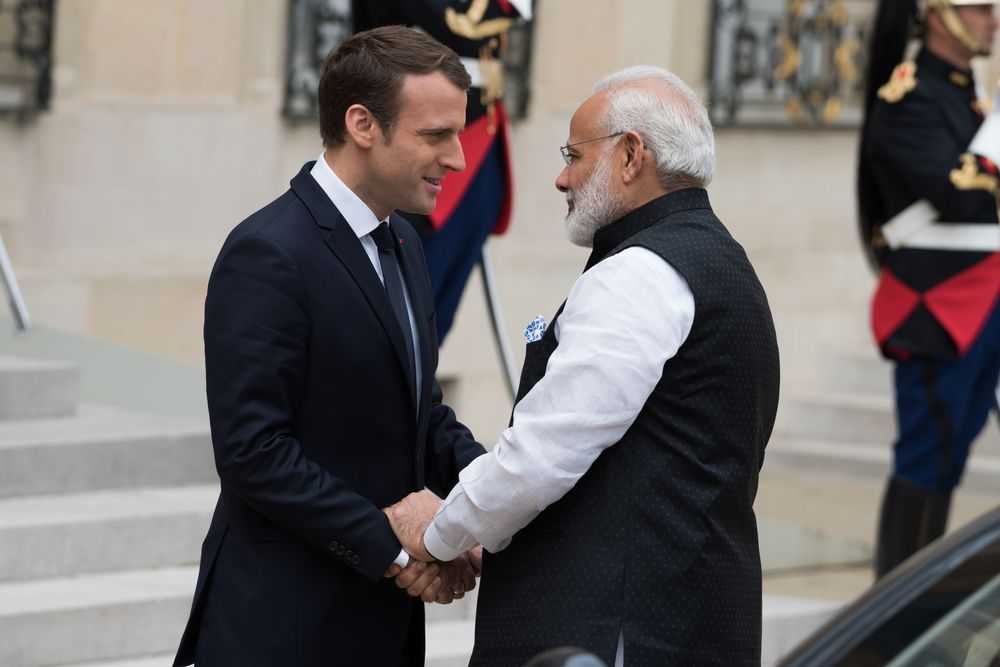Home>Narendra Modi as a Guest of Honour at the French National Holiday Celebrations.

12.07.2023
Narendra Modi as a Guest of Honour at the French National Holiday Celebrations.
Interview with Christophe Jaffrelot
The President of the French Republic, Emmanuel Macron, has made India and its Prime Minister, Narendra Modi, a guest of honour at the celebrations on 14 July, France’s national holiday. This interview with Christophe Jaffrelot, a renowned expert on the Indian subcontinent explores the reasons for this invitation, and for the strong reactions that it has generated.
For French Greens, Emmanuel Macron’s decision to invite Narendra Modi to be the guest of honour at the 14 July military parade is a “major political error”. This invitation, which is a matter of national interest, is considered a commercial and strategic decision. What is your opinion?
It is not easy to disentangle the national interest from specific interests! On the one hand, India is an important partner for France in its efforts to counterbalance China in the Indo-Pacific—a strategy that is also being pursued by the United States, where Narendra Modi has just made a much-publicised visit. For France, the stakes are even higher given that it is a resident power in the Indian Ocean, where New Delhi and Paris are seeking greater cooperation.
On the other hand, national interest can also be reflected in economic diplomacy. This form of diplomacy is becoming increasingly important and big contracts are a cornerstone of it—such as the orders India has placed with Airbus and the military industry.
General elections are due to be held in India in the spring of 2024. What is the political situation in the country just under a year before the elections? Is there still any opposition in India after Rahul Gandhi was sidelined?
There is opposition to Narendra Modi’s BJP, but it is fragmented. In fact, it is most alive at the level of the States of the Indian Union. This explains why the BJP governs only a handful of the twenty-nine States of the Union. Yet, what these regional parties seek to dominate above all is their own provinces. Consequently, they avoid upsetting New Delhi. However, the Congress party is on the comeback trail, as evidenced by its resounding victory in the southern state of Karnataka last month, and could regain its former ability to be at the centre of a coalition of many regional parties. This is partly due to the new-found popularity of its leader, Rahul Gandhi, following his “long march”—a 4,000-kilometre trek from the south to the north of India last year that left a lasting impression. However, this will not be enough to dislodge Modi from power in 2024, unless, perhaps, Rahul crosses India again, this time from west to east...
What can be said about the situation of non-Hindus (Muslims, Christians) in present-day India?
Religious minorities such as Muslims and Christians are increasingly discriminated against. Their representation within the political elite—which has never been proportional to their demographic weight—is on the decline (according to the 2011 census, only 5% of MPs are Muslim, even though this religious minority represents 14.5% of the population).
Above all, Muslims and Christians in India are targeted by Hindu vigilante groups which operate a real cultural police force. This takes the form of actions against what they call “love jihad”, a formula denouncing the supposed seduction of Hindu women by young Muslims—hence the attacks on them when they date Hindu women (on university campuses or elsewhere). Cultural policing also takes the form of the fight against so-called “land jihad”, which this time consists of preventing Muslims from settling in Hindu neighbourhoods, resulting in a process of ghettoisation. Finally, in the name of protecting cows, Muslim farmers are hunted down and even lynched, on the pretext that they are taking cattle to the slaughterhouse. In addition to these practices, minorities are targeted by segregationist laws, such as those making inter-religious marriages and conversions almost impossible.
How do you explain the widespread silence from Western states regarding Narendra Modi’s growing authoritarianism?
This question brings us back to the first: the West turns a blind eye because it has multiple interests in India.
There are other explanations. Firstly, New Delhi responds immediately—and harshly—to the slightest questioning of the democratic nature of its regime. Secondly, India can still be considered democratic because it holds elections at regular intervals. This is the hallmark of populist authoritarian regimes: their leaders need the legitimacy conferred by universal suffrage to rise above the institutions that are supposed to uphold the rule of law, such as the judiciary. Elections are not really competitive, however (because the opposition has neither the same media coverage nor the same financial resources), and between elections, a form of authoritarianism tends to prevail.
Indeed, the separation of powers is threatened by the challenge to the independence of the judiciary: while Supreme Court judges continue to be co-opted by their peers, the Minister of Law and Justice only approves the appointment of those who seem to please the government... In fact, the Indian Supreme Court, which had held the executive in contempt for decades, has not made a single decision against the government in over five years.
Interview by Corinne Deloy.
English version by Miriam Périer and Caitlin Gordon Walker.
Cover photo: Paris, 3 June 2017, French President Emmanuel Macron receives Indian Prime Minister Narendra Modi for a work visit. Photo © Frédéric Legrand COMEO for Shutterstock.
(credits: Frédéric Legrand COMEO pour Shutterstock.)
Follow us
Contact us
Media Contact
Coralie Meyer
Phone : +33 (0)1 58 71 70 85
coralie.meyer@sciencespo.fr
Corinne Deloy
Phone : +33 (0)1 58 71 70 68
corinne.deloy@sciencespo.fr
